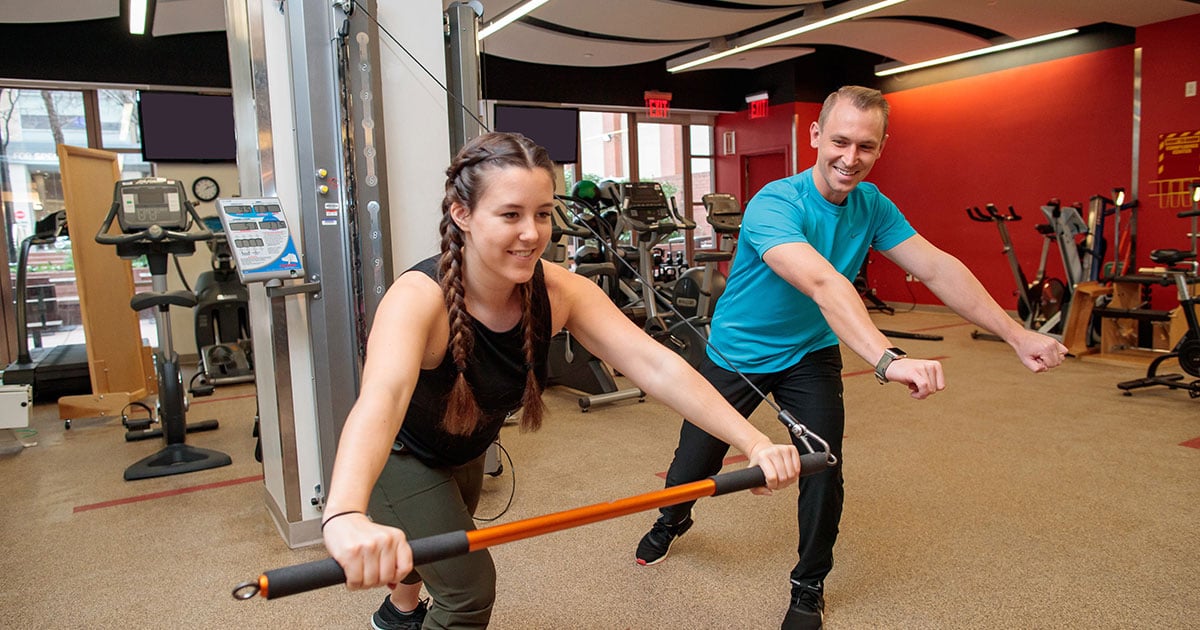
Advice to improve your movement, fitness, and overall health from the #1 in orthopedics in the U.S.
How to Find a Physical Therapist
It’s crucial to do your research before choosing a physical therapist so you can be sure they can help you meet your goals.
Advice to improve your movement, fitness, and overall health from the #1 in orthopedics in the U.S.

"There are many factors that should be taken into account when deciding where to go for physical therapy,” says JeMe Cioppa-Mosca, senior vice president of Rehabilitation and Performance at HSS, which includes clinic locations in New York City, Long Island and Westchester County in New York; New Jersey; Connecticut and Florida.
It's important to find a physical therapist with whom you have a good rapport, says Robin Benick, director of the HSS Rehabilitation National Network. The network, which is entering its 29th year, currently includes more than 1,500 providers across the country who meet HSS standards of care. "Communication is key,” Benick adds. “It's a partnership."
Here are a few questions to ask as you choose a PT practice.
Do you need a physician referral?
Every state in the United States currently allows some level of direct access to physical therapy. In many cases patients can begin physical therapy without a referral. Direct access is meant to increase accessibility to a qualified physical therapist so that people can be evaluated quickly and determine next steps for care.
If health insurance is an important consideration for you, make sure any practice you’re interested in accepts your insurance.
How quickly can the physical therapist see you?
Consider how quickly you can get an appointment. If you need to wait more than a week or two, you may be better off finding a facility where you can start sooner, especially if you’ve had recent surgery. It’s also a good idea to ask about the cancellation policy. Some facilities charge a fee for cancelling an appointment.
Can you collect referrals or feedback from others?
Beyond HSS Rehabilitation and HSS National Network locations, you may also want to ask your doctor or a friend for recommendations. Just keep in mind that friends or family may have received PT for an issue different from yours, so their recommendation may not be appropriate for you. Certified specialties range from pediatric to geriatric physical therapy. Some PTs may focus more on sports medicine, while others may specialize in rehabilitation for neck and back problems or after joint replacement, for example.
Who will be treating you, and what are their credentials?
The American Board of Physical Therapy Specialties (ABPTS) offers an advanced degree of certification in a number of clinical specialty areas, including Board-Certified Clinical Specialist in Orthopaedic Physical Therapy (OCS), Board-Certified Clinical Specialist in Pediatric Physical Therapy (PCS), and Board-Certified Clinical Specialist in Sports Physical Therapy (SCS). Call the facility and ask questions to make sure there are physical therapists with expertise in treating your particular problem. Ask who will be treating you and how much experience the therapist has.
At HSS, more than 85 percent of our physical therapists have advanced certifications.
Is the location convenient?
Since physical therapy is usually a weekly commitment and may last for an extended period of time, convenience is an important consideration. The facility’s location shouldn’t take you too far out of your usual routine, or it will be difficult to keep regular appointments. HSS offers rehabilitation at many convenient locations in the tristate area, including in Manhattan; Brooklyn; Westchester County, New York; New Jersey; and Connecticut as well as Florida. The HSS Rehabilitation National Network map offers an easy way to search for and find more information about member PT practices nationwide.
What is virtual PT and how do I know if it’s right for me?
Virtual physical therapy has been developing over the years. However, one of the silver linings of the COVID-19 pandemic was a leap forward in the world of telehealth and virtual healthcare. During a virtual physical therapy appointment, a PT can do the same things they would do in person, with the exception of providing hands-on care or manual therapy (using their hands). For exercise-based treatments, virtual PT can be very successful in helping people to recover and meet their goals. Virtual physical therapy evaluation and treatment is offered at all HSS Rehab locations as well as at other private practice locations.
Can you visit the facility?
Try to set up a time to take a quick tour of the facility before beginning therapy, even if it’s virtual. Some things to make note of:
- Are therapists working with multiple patients at one time? Are therapists and therapy assistants actively working with patients, or are people standing around waiting to be treated?
- Is equipment wiped down between patients? Are therapists washing their hands between patients?
- Are people working there wearing a name badge with their job title? They are required to do so in many states, including New York.
- If you require special equipment, such as a pool, make sure it is available at the facility.
Is everyone who is treating you properly licensed?
Once you decide where to go, you should be evaluated and treated by a licensed physical therapist. Physical therapy assistants are also trained, licensed professionals, and your therapist may work with an assistant to provide your care.
You should not be receiving treatment from an unlicensed physical therapy aide or technician. Aides help physical therapists with tasks such as basic administrative duties, getting treatment areas ready and escorting patients within the clinic, but they are not legally permitted to provide treatment or instruct patients in exercises. If you’re not sure of the credentials of the person treating you, you have the right to ask.
If you ever feel uncomfortable or if an exercise or treatment is painful, speak up. If you feel the physical therapist is not spending enough time with you or appears distracted, you may want to find someone who offers more personalized care and attention.
Are you receiving exercises to do at home?
You should also receive instruction on exercises to do at home. The therapist may provide handouts, a link to a video demonstrating the correct movements, or another form of instruction to ensure you are doing the exercise correctly.
For more information about finding the right physical therapist for you:
Published 1/23/2023


